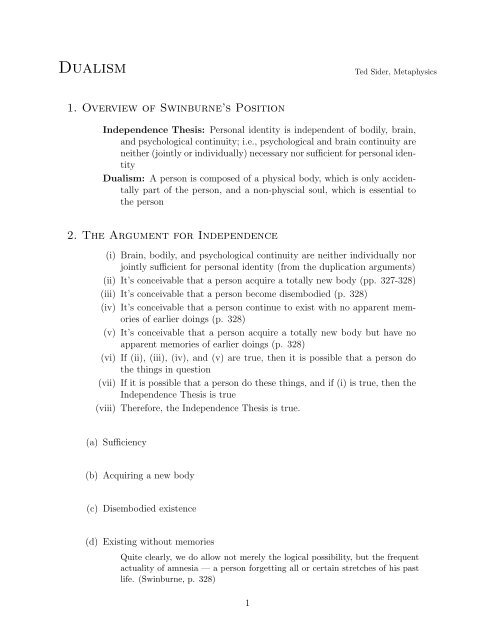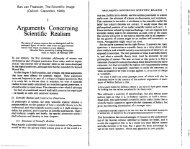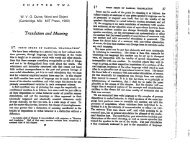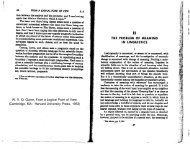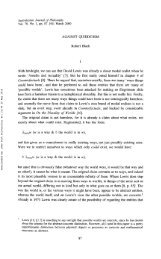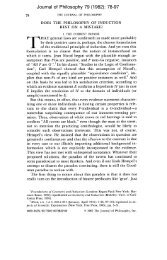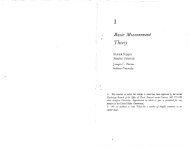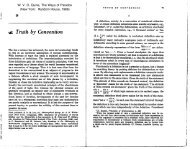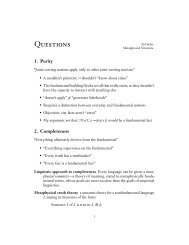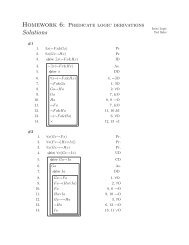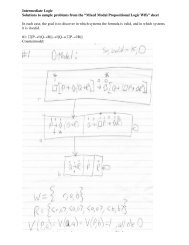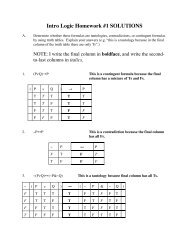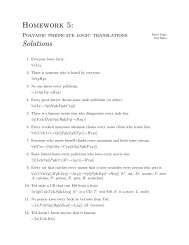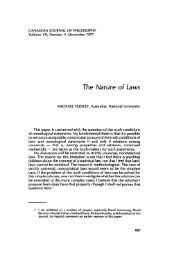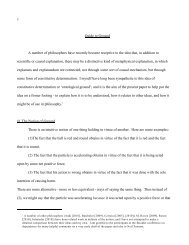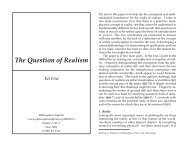Dualism - Ted Sider
Dualism - Ted Sider
Dualism - Ted Sider
Create successful ePaper yourself
Turn your PDF publications into a flip-book with our unique Google optimized e-Paper software.
<strong>Dualism</strong> <strong>Ted</strong> <strong>Sider</strong>, Metaphysics<br />
1. Overview of Swinburne’s Position<br />
Independence Thesis: Personal identity is independent of bodily, brain,<br />
and psychological continuity; i.e., psychological and brain continuity are<br />
neither (jointly or individually) necessary nor sufficient for personal identity<br />
<strong>Dualism</strong>: A person is composed of a physical body, which is only accidentally<br />
part of the person, and a non-physcial soul, which is essential to<br />
the person<br />
2. The Argument for Independence<br />
(i) Brain, bodily, and psychological continuity are neither individually nor<br />
jointly sufficient for personal identity (from the duplication arguments)<br />
(ii) It’s conceivable that a person acquire a totally new body (pp. 327-328)<br />
(iii) It’s conceivable that a person become disembodied (p. 328)<br />
(iv) It’s conceivable that a person continue to exist with no apparent memories<br />
of earlier doings (p. 328)<br />
(v) It’s conceivable that a person acquire a totally new body but have no<br />
apparent memories of earlier doings (p. 328)<br />
(vi) If (ii), (iii), (iv), and (v) are true, then it is possible that a person do<br />
the things in question<br />
(vii) If it is possible that a person do these things, and if (i) is true, then the<br />
Independence Thesis is true<br />
(viii) Therefore, the Independence Thesis is true.<br />
(a) Sufficiency<br />
(b) Acquiring a new body<br />
(c) Disembodied existence<br />
(d) Existing without memories<br />
Quite clearly, we do allow not merely the logical possibility, but the frequent<br />
actuality of amnesia — a person forgetting all or certain stretches of his past<br />
life. (Swinburne, p. 328)<br />
1
(e) Existing without memories and with an entirely new body<br />
. . . many religions have taken seriously stories of persons passing through the<br />
waters of Lethe (a river whose waters made a person forget all his previous<br />
life) and then acquiring a new body. (Shoemaker and Swinburne, Personal<br />
Identity, p. 25.)<br />
Those who hope to survive their death, despite the destruction of their body,<br />
will not necessarily be disturbed if they come to believe that they will then<br />
have no memory of their past life on Earth; they may just want to survive and<br />
have no interest in continuing to recall life on Earth. Again, apparently, there<br />
seems to be no contradiction involved in their belief. (Swinburne, p. 328)<br />
(f) Conceivability and possibility<br />
Admittedly, there may be stories or beliefs which involve a hidden contradiction<br />
when initially they do not seem to do so. But the fact that there seems<br />
(and to so many people) to be no contradiction hidden in these stories is good<br />
reason for supposing that there is no contradiction hidden in them — until a<br />
contradiction is revealed. If this were not a good reason for believing there to<br />
be no contradiction, we would have no good reason for belieiving any sentence<br />
at all to be free of hidden contradiction. (Swinburne, pp. 328-329)<br />
(g) The final premise<br />
(h) Evaluating the argument for Independence<br />
Examples of conceivable impossibilities:<br />
• a regular 17-sided polyhedron<br />
• a barber who shaves all and only those people who don’t shave<br />
themselves<br />
• according to some: a permissible lie<br />
• according to Swinburne: a person who survives without a soul<br />
We clearly and distinctly conceive of something when we can visualize it<br />
or otherwise imagine it in such perfect detail so as to definitively remove<br />
any possibility of a hidden contradiction<br />
2
3. From Independence to <strong>Dualism</strong><br />
(a) Aristotle revisited<br />
What makes a substance the same substance as an earlier substance is that<br />
its matter is the same, or obtained from the matter of the former substance<br />
by gradual replacement, while continuing to possess the essential properties<br />
which constitute its form. (Swinburne, pp. 318-319)<br />
(b) Indivisibility<br />
Revised Aristotelian Theory: What makes a substance the same substance<br />
as an earlier substance is that the “stuff” from which it is made<br />
(whether this is material or immaterial stuff) is the same, or obtained<br />
from the stuff of the former substance by gradual replacement, while<br />
continuing to possess the essential properties which constitute its<br />
form<br />
Swinburne says: matter can always be divided. But that’s because it’s<br />
extended. There is no such argument for souls. Therefore, there’s no<br />
obstacle to saying that souls are indivisible.<br />
Objections:<br />
• Matter isn’t all extended.<br />
• Soul stuff may be in some sense extended.<br />
• If souls are indivisible, how can they have mental properties?<br />
• What’s at stake? The solution to the duplication problem.<br />
(c) Swinburne’s argument for souls<br />
(i) Necessarily: if I continue to exist without any of the same physical<br />
stuff as my previous self, then I must have a soul (Aristotle)<br />
(ii) Possibly, I continue to exist but without any of the same physical<br />
stuff as my previous self (Descartes)<br />
(iii) Therefore, I have a soul<br />
A parallel argument:<br />
(i) Necessarily: if a thing is a bachelor, then it is unmarried<br />
(ii) Possibly: Bill Clinton is a bachelor<br />
(iii) Therefore, Bill Clinton is unmarried<br />
3
(d) Identity vs. Parthood<br />
<strong>Dualism</strong>: Persons are composed of a physical body, which is only accidentally<br />
part of the person, and a non-physcial soul, which is essential<br />
to the person.<br />
(e) <strong>Dualism</strong> and Immortality<br />
4. Objections to <strong>Dualism</strong><br />
(a) The epistemological objection<br />
(i) If <strong>Dualism</strong> is true, then we have no knowledge of personal identity<br />
(ii) But we do have some knowledge of personal identity<br />
(iii) Therefore, <strong>Dualism</strong> is false<br />
(b) The traditional problem of skepticism<br />
Idealism: Reality is entirely mental<br />
Realism: A large part of reality is non-mental. This part would be<br />
exactly as it actually is if there were no minds.<br />
(i) If Realism is true, then we have no knowledge of the external world<br />
(ii) But we do have some knowledge of the external world<br />
(iii) Therefore, Realism is false<br />
(c) The problem of interaction<br />
Soul theorists must account for causal interaction between souls and physical<br />
objects, despite the fact that souls lack the physical properties involved<br />
in familiar causal interactions<br />
(d) Souls are gratuitous<br />
4


